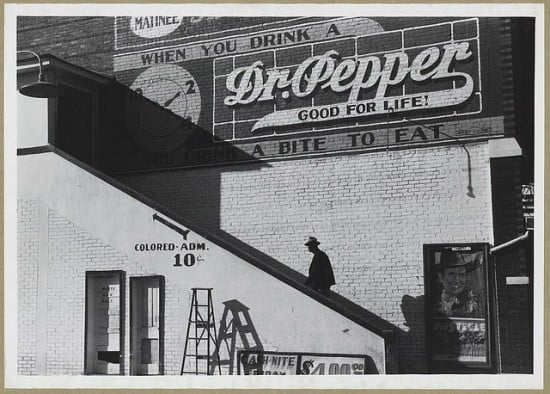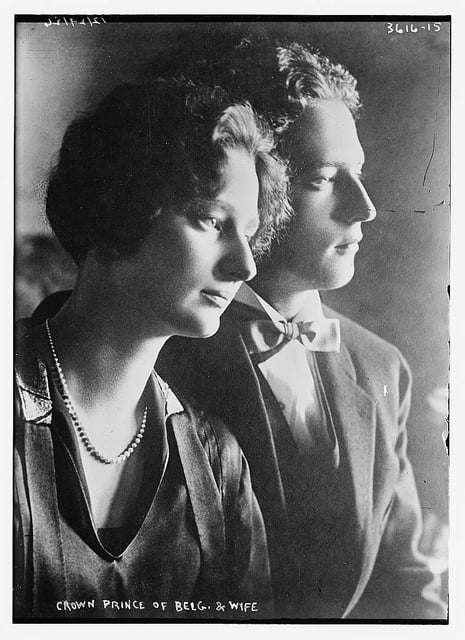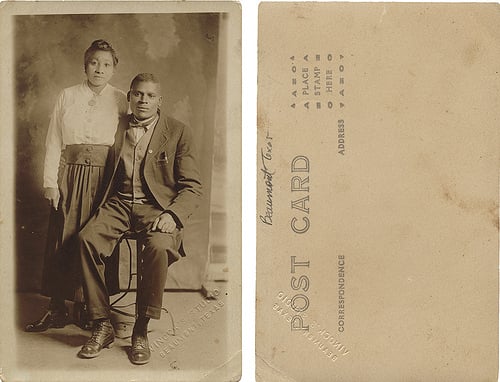The Comet (5)
By:
June 18, 2013
HILOBROW is pleased to present the fifth and final installment of our serialization of “The Comet,” a 1920 science fiction story by W.E.B. DuBois, the most important black protest leader in the United States during the first half of the 20th century. “The Comet” was originally published as the tenth chapter of Du Bois’s avant-garde fiction, poetry, and autobiographical collection Darkwater: Voices From Within the Veil.
SUBSCRIBE to HILOBROW’s serialized fiction via RSS.
ALL INSTALLMENTS: 1 | 2 | 3 | 4 | 5
He did not glimpse the glory in her eyes, but stood looking outward toward the sea and sending rocket after rocket into the unanswering darkness. Dark-purple clouds lay banked and billowed in the west. Behind them and all around, the heavens glowed in dim, weird radiance that suffused the darkening world and made almost a minor music. Suddenly, as though gathered back in some vast hand, the great cloud-curtain fell away. Low on the horizon lay a long, white star — mystic, wonderful! And from it fled upward to the pole, like some wan bridal veil, a pale, wide sheet of flame that lighted all the world and dimmed the stars.
In fascinated silence the man gazed at the heavens and dropped his rockets to the floor. Memories of memories stirred to life in the dead recesses of his mind. The shackles seemed to rattle and fall from his soul. Up from the crass and crushing and cringing of his caste leaped the lone majesty of kings long dead. He arose within the shadows, tall, straight, and stern, with power in his eyes and ghostly scepters hovering to his grasp. It was as though some mighty Pharaoh lived again, or curled Assyrian lord. He turned and looked upon the lady, and found her gazing straight at him.
Silently, immovably, they saw each other face to face — eye to eye. Their souls lay naked to the night. It was not lust; it was not love — it was some vaster, mightier thing that needed neither touch of body nor thrill of soul. It was a thought divine, splendid.
Slowly, noiselessly, they moved toward each other — the heavens above, the seas around, the city grim and dead below. He loomed from out the velvet shadows vast and dark. Pearl-white and slender, she shone beneath the stars. She stretched her jeweled hands abroad. He lifted up his mighty arms, and they cried each to the other, almost with one voice, “The world is dead.”
“Long live the —”
“Honk! Honk!” Hoarse and sharp the cry of a motor drifted clearly up from the silence below. They started backward with a cry and gazed upon each other with eyes that faltered and fell, with blood that boiled.
“Honk! Honk! Honk! Honk!” came the mad cry again, and almost from their feet a rocket blazed into the air and scattered its stars upon them. She covered her eyes with her hands, and her shoulders heaved. He dropped and bowed, groped blindly on his knees about the floor. A blue flame spluttered lazily after an age, and she heard the scream of an answering rocket as it flew.
Then they stood still as death, looking to opposite ends of the earth.
“Clang — crash — clang!”
The roar and ring of swift elevators shooting upward from below made the great tower tremble. A murmur and babel of voices swept in upon the night. All over the once dead city the lights blinked, flickered, and flamed; and then with a sudden clanging of doors the entrance to the platform was filled with men, and one with white and flying hair rushed to the girl and lifted her to his breast. “My daughter!” he sobbed.
Behind him hurried a younger, comelier man, carefully clad in motor costume, who bent above the girl with passionate solicitude and gazed into her staring eyes until they narrowed and dropped and her face flushed deeper and deeper crimson.
“Julia,” he whispered; “my darling, I thought you were gone forever.”
She looked up at him with strange, searching eyes.
“Fred,” she murmured, almost vaguely, “is the world — gone?”
“Only New York,” he answered; “it is terrible — awful! You know, — but you, how did you escape — how have you endured this horror? Are you well? Unharmed?”
“Unharmed!” she said.
“And this man here?” he asked, encircling her drooping form with one arm and turning toward the Negro. Suddenly he stiffened and his hand flew to his hip. “Why!” he snarled. “It’s — a — nigger — Julia! Has he — has he dared —”
She lifted her head and looked at her late companion curiously and then dropped her eyes with a sigh.
“He has dared — all, to rescue me,” she said quietly, “and I — thank him — much.” But she did not look at him again. As the couple turned away, the father drew a roll of bills from his pockets.
“Here, my good fellow,” he said, thrusting the money into the man’s hands, “take that, — what’s your name?”
“Jim Davis,” came the answer, hollow-voiced.
“Well, Jim, I thank you. I’ve always liked your people. If you ever want a job, call on me.” And they were gone.
The crowd poured up and out of the elevators, talking and whispering.
“Who was it?”
“Are they alive?”
“How many?”
“Two!”
“Who was saved?”
“A white girl and a nigger — there she goes.”
“A nigger? Where is he? Let’s lynch the damned —”
“Shut up — he’s all right — he saved her.”
“Saved hell! He had no business —”
“Here he comes.”
Into the glare of the electric lights the colored man moved slowly, with the eyes of those that walk and sleep.
“Well, what do you think of that?” cried a bystander; “of all New York, just a white girl and a nigger!”
The colored man heard nothing. He stood silently beneath the glare of the light, gazing at the money in his hand and shrinking as he gazed; slowly he put his other hand into his pocket and brought out a baby’s filmy cap, and gazed again. A woman mounted to the platform and looked about, shading her eyes. She was brown, small, and toil-worn, and in one arm lay the corpse of a dark baby. The crowd parted and her eyes fell on the colored man; with a cry she tottered toward him.
“Jim!”
He whirled and, with a sob of joy, caught her in his arms.
RADIUM AGE SCIENCE FICTION: “Radium Age” is HILOBROW’s name for the 1904–33 era, which saw the discovery of radioactivity, the revelation that matter itself is constantly in movement — a fitting metaphor for the first decades of the 20th century, during which old scientific, religious, political, and social certainties were shattered. This era also saw the publication of genre-shattering writing by Edgar Rice Burroughs, Sax Rohmer, E.E. “Doc” Smith, Jack London, Arthur Conan Doyle, Aldous Huxley, Olaf Stapledon, Karel Čapek, H.P. Lovecraft, Charlotte Perkins Gilman, Yevgeny Zamyatin, Philip Gordon Wylie, and other pioneers of post-Verne/Wells, pre-Golden Age “science fiction.” More info here.
READ GORGEOUS PAPERBACKS: HiLoBooks has reissued the following 10 obscure but amazing Radium Age science fiction novels in beautiful print editions: Jack London’s The Scarlet Plague, Rudyard Kipling’s With the Night Mail (and “As Easy as A.B.C.”), Arthur Conan Doyle’s The Poison Belt, H. Rider Haggard’s When the World Shook, Edward Shanks’ The People of the Ruins, William Hope Hodgson’s The Night Land, J.D. Beresford’s Goslings, E.V. Odle’s The Clockwork Man, Cicely Hamilton’s Theodore Savage, and Muriel Jaeger’s The Man with Six Senses. For more information, visit the HiLoBooks homepage.
SERIALIZED BY HILOBOOKS: Jack London’s The Scarlet Plague | Rudyard Kipling’s With the Night Mail (and “As Easy as A.B.C.”) | Arthur Conan Doyle’s The Poison Belt | H. Rider Haggard’s When the World Shook | Edward Shanks’ The People of the Ruins | William Hope Hodgson’s The Night Land | J.D. Beresford’s Goslings | E.V. Odle’s The Clockwork Man | Cicely Hamilton’s Theodore Savage | Muriel Jaeger’s The Man With Six Senses | Jack London’s “The Red One” | Philip Francis Nowlan’s Armageddon 2419 A.D. | Homer Eon Flint’s The Devolutionist | W.E.B. DuBois’s “The Comet” | Edgar Rice Burroughs’s The Moon Men | Charlotte Perkins Gilman’s Herland | Sax Rohmer’s “The Zayat Kiss” | Eimar O’Duffy’s King Goshawk and the Birds | Frances Hodgson Burnett’s The Lost Prince | Morley Roberts’s The Fugitives | Helen MacInnes’s The Unconquerable | Geoffrey Household’s Watcher in the Shadows | William Haggard’s The High Wire | Hammond Innes’s Air Bridge | James Branch Cabell’s Jurgen | John Buchan’s “No Man’s Land” | John Russell’s “The Fourth Man” | E.M. Forster’s “The Machine Stops” | John Buchan’s Huntingtower | Arthur Conan Doyle’s When the World Screamed | Victor Bridges’ A Rogue By Compulsion | Jack London’s The Iron Heel | H. De Vere Stacpoole’s The Man Who Lost Himself | P.G. Wodehouse’s Leave It to Psmith | Richard Connell’s “The Most Dangerous Game” | Houdini and Lovecraft’s “Imprisoned with the Pharaohs” | Arthur Conan Doyle’s “The Sussex Vampire”.
ORIGINAL FICTION: HILOBROW has serialized three novels: James Parker’s The Ballad of Cocky The Fox (“a proof-of-concept that serialization can work on the Internet” — The Atlantic); Karinne Keithley Syers’s Linda Linda Linda (which includes original music); and Robert Waldron’s roman à clef The School on the Fens. We also publish original stories and comics. These include: Matthew Battles’s stories “Gita Nova“, “Makes the Man,” “Imago,” “Camera Lucida,” “A Simple Message”, “Children of the Volcano”, “The Gnomon”, “Billable Memories”, “For Provisional Description of Superficial Features”, “The Dogs in the Trees”, “The Sovereignties of Invention”, and “Survivor: The Island of Dr. Moreau”; several of these later appeared in the collection The Sovereignties of Invention | Peggy Nelson’s “Mood Indigo“, “Top Kill Fail“, and “Mercerism” | Annalee Newitz’s “The Great Oxygen Race” | Flourish Klink’s Star Trek fanfic “Conference Comms” | Charlie Mitchell’s “A Fantasy Land” | Charlie Mitchell’s “Sentinels” | Joshua Glenn’s “The Lawless One”, and the mashup story “Zarathustra vs. Swamp Thing” | Adam McGovern and Paolo Leandri’s Idoru Jones comics | John Holbo’s “Sugarplum Squeampunk” | “Another Corporate Death” (1) and “Another Corporate Death” (2) by Mike Fleisch | Kathryn Kuitenbrouwer and Frank Fiorentino’s graphic novel “The Song of Otto” (excerpt) | John Holbo’s graphic novel On Beyond Zarathustra (excerpt) | “Manoj” and “Josh” by Vijay Balakrishnan | “Verge” by Chris Rossi, and his audio novel Low Priority Hero | EPIC WINS: THE ILIAD (1.408-415) by Flourish Klink | EPIC WINS: THE KALEVALA (3.1-278) by James Parker | EPIC WINS: THE ARGONAUTICA (2.815-834) by Joshua Glenn | EPIC WINS: THE MYTH OF THE ELK by Matthew Battles | TROUBLED SUPERHUMAN CONTEST: Charles Pappas, “The Law” | CATASTROPHE CONTEST: Timothy Raymond, “Hem and the Flood” | TELEPATHY CONTEST: Rachel Ellis Adams, “Fatima, Can You Hear Me?” | OIL SPILL CONTEST: A.E. Smith, “Sound Thinking | LITTLE NEMO CAPTION CONTEST: Joe Lyons, “Necronomicon” | SPOOKY-KOOKY CONTEST: Tucker Cummings, “Well Marbled” | INVENT-A-HERO CONTEST: TG Gibbon, “The Firefly” | FANFICTION CONTEST: Lyette Mercier’s “Sex and the Single Superhero”



